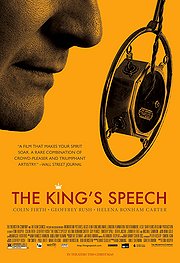But a problem arises when the Emperor may have clothes, and pedigree, but he has no authority to govern, to raise an army, to make executive decisions, and instead he is expected to be a public spokesperson for the nation and to the nation. The problem becomes acute if your name is Albert and you have been stammering and stuttering since you were five, and your older brother abdicates in order to marry ‘Ms. Simpson’ an American divorcee, and to top it all off, all this comes crashing down on your head just as Adolph Hitler has cleared his throat and begun to take over Europe. How’s a king to cope? The answer surprisingly enough is with the help of the most unconventional Aussie speech therapist ever!
‘The King’s Speech’ for one hour and 51 minutes leads us through the heart-wrenching story of a sensitive boy berated, and brow-beaten by his father because he can’t get his words out, who develops a speech problem early on in life which haunts him well into adulthood. The story is told well, and the acting in this film is superb— Colin Firth plays the role of his career as ‘Bertie’ the stammering king in waiting, And Helena Bonham Carter is equally compelling as Elizabeth, the wonderfully supportive wife, and the mother of our present Queen Elizabeth. But the total revelation comes in the person of Geoffrey Rush who plays Lionel Logue, the unconventional speech therapist. If we throw in for good measure the last ever performance of Derek Jacobi as the Archbishop of Canterbury, Cosmo Lang, we have a veritable acting feast in this film, which by rights should produce at least two Academy Awards for acting.
If the acting were not enough to get you to see this film, the story is equally compelling, and the dialogue is witty and wonderful. When Lionel says to Bertie during one speech session, ‘the goal here is to make sure we have a good connection between what is in the royal mind and what comes out of the royal mouth’ Bertie retorts ‘You don’t know much about royals do you?’ There are many instances in this movie which are both touching and laugh out loud funny, leading up to the climactic speech that ‘Bertie’ must give to a nation now officially going to war with Hitler and his 3rd Reich.
The costumes and period feel of this movie are spot on, as the Brits would say, and we are ushered into a more primitive age where people actually believed that stuttering could be a purely physiological problem, not a psychological problem. And this is where Lionel Logue stands apart, for he knew very well that the mind was the source of this problem, not the tongue, in the vast majority of cases. Thus despite resistance from ‘Bertie’ Lionel continues to probe with personal questions to get at the root of Bertie’s problem, the sensitive younger brother, overshadowed by a flamboyant and charismatic older brother (who was briefly King Edward VIII), and grieving the lose of another brother who was an epileptic and died young. This films probes deep into the heart of the pre-WWII royals and their daily lives and reveals that they have the same sort of problems we all do, only magnified since sometimes they must be played out in public, in this case before the wireless and newspapers, and the beginnings of film reels.
I have seldom seen a drama this compelling, and a story this well portrayed, and the glory of it all is that this is an absolutely true story, with a happy ending. Lionel and Bertie remained fast friends the rest of their lives, and a grateful royal family treated this commoner with respect, which he fully deserved. There are many different genre of film, and certainly historical drama is one important such type or kind.
This is the best true story, the best period piece I have seen in a long time….and I hope you will take the trouble to go see it. It will make you laugh and cry, and smile if you have any humane bones in your body. Yes, there is some occasional bad language in the film, but otherwise it is a very suitable film for families. Indeed it portrays a warm and loving family. This is a film about overcoming personal obstacles with the help of a mediator and friend. It’s a film most of us can relate to if we have had a seminal teacher or educator who helped get us to where we are today. I have had such a mentor, and I can tell you— this film left normally loquacious me, speechless, and wanting more.

